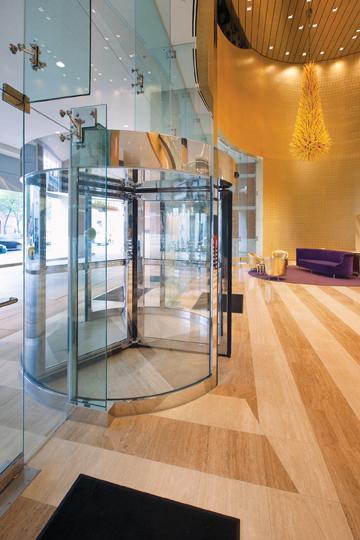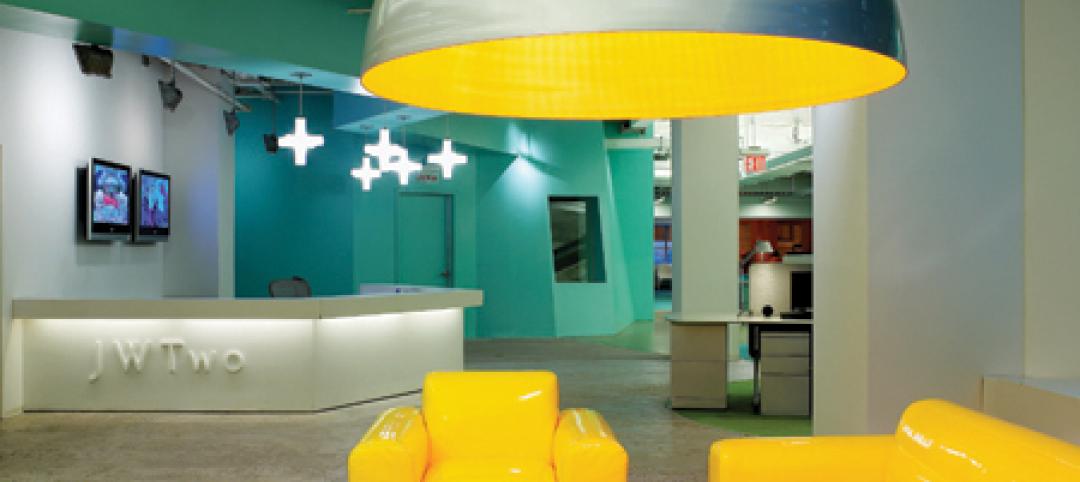Beyond the door material, another important decision is determining whether a more sophisticated door system is required for the application. In the MasterFormat section 08 30 00, Specialty Doors and Frames, a number of door types are listed for special functions, access locations, sliding and folding hardware, and even pressure-resistant types. Among these, there are several mentioned by Building Teams for consideration today:
• Pivoted or hinged doors. Both pivots and hinges can be used interchangeably, although hinged, prefabricated doors are generally less expensive. The presentation of the door types is the key factor. A hinged door typically reveals a knuckle spanning 4½ inches, while a pivot door’s profile is much smaller, with a 1½-inch knuckle. (Means Illustrated Construction Dictionary defines a door knuckle as “one of the enlarged, protruding, cylindrical parts of a hinge through which the pin is inserted.) The pivot door also offers a higher level of durability, making it a common choice for commercial applications.
• Balanced doors. Ideal for windy climates, a balanced door is a more sophisticated, engineered system for exterior entrances. “The balanced door system is a complete assembly where the hanging and closing of the door is controlled by the door system, negating some of the effects of excessive wind conditions,” says Jim Berg, a veteran door systems consultant.
If a balanced door isn’t in the budget, then pivoted or hinged doors need to be designed with higher opening and closing forces, as more of the door leaf is exposed to the wind.
• Automatic and revolving doors. Automatic doors are commonly used to meet the requirements of the Americans with Disabilities Act, or simply to handle highly trafficked entrances, as in hospitals and grocery stores. Because the price difference between automatic and revolving doors is substantial, revolving doors are usually reserved for buildings with significant weather requirements.
Revolving doors can also be helpful in mitigating the effects of strong negative and positive air pressures created by the HVAC systems and outdoor conditions, which cause wear and tear to a typical door. Consequently, the number of service calls is reduced with revolving or vestibule door systems.
According to Studio 08 Principal Rick Lewis, the most common type of revolving door is the single-post door. However, “Many of the airports are now using a type that allows more people to be in the door unit at one time, to move more traffic,” he says. Today there are small, three- and four-wing models for lower-traffic applications, while the large, two-wing or three-wing automatic revolving doors are more common in retail centers, hospitals, and transportation centers.
In most applications, a low-energy power operator meeting ANSI A156.19 (Standard for Power Assist and Low Energy Power Operated Doors) is specified as an ADA-compliant installation. However, for industrial settings, a heavy-duty power operator compliant with ANSI A156.10 (American National Standard for Power Operated Pedestrian Doors) is used. The industrial types are often specified with a ramp and guides, as the doors generally don’t stop and reset if a person or object enters the sensory field.
While the lower energy operators do stop and reset, this action can eventually wear down the mechanism. “Currently, manufactured units are considerably better than the ones that first came out 20 years ago,” says Lewis. “However, an ANSI A156.10 unit requires a lot of maintenance because the door operator is used each time a person, cart, or motorized vehicle passes through the opening.” Lewis says there is considerable power and momentum in the door as an operator is functioning, and “this causes not only the operators to receive a lot of abuse, but also the doors and frames.”
While retrofitting ordinary doors into automatic doors can be difficult and expensive, there are cases where there is no way around the problem for certain types of buildings, such as churches, temples, mosques, and other religious institutions, which are now required by ADA standards to update their access points. +
Related Stories
| Aug 11, 2010
Florida mixed-use complex includes retail, residential
The $325 million Atlantic Plaza II lifestyle center will be built on 8.5 acres in Delray Beach, Fla. Designed by Vander Ploeg & Associates, Boca Raton, the complex will include six buildings ranging from three to five stories and have 182,000 sf of restaurant and retail space. An additional 106,000 sf of Class A office space and a residential component including 197 apartments, townhouses, ...
| Aug 11, 2010
Restoration gives new life to New Formalism icon
The $30 million upgrade, restoration, and expansion of the Mark Taper Forum in Los Angeles was completed by the team of Rios Clementi Hale Studios (architect), Harley Ellis Devereaux (executive architect/MEP), KPFF (structural engineer), and Taisei Construction (GC). Work on the Welton Becket-designed 1967 complex included an overhaul of the auditorium, lighting, and acoustics.
| Aug 11, 2010
Best AEC Firms to Work For
2006 FreemanWhite Hnedak Bobo Group McCarthy Building Companies, Inc. Shawmut Design and Construction Walter P Moore 2007 Anshen+Allen Arup Bovis Lend Lease Cannon Design Jones Lang LaSalle Perkins+Will SmithGroup SSOE, Inc. Timothy Haahs & Associates, Inc. 2008 Gilbane Building Co. HDR KJWW Engineering Consultants Lord, Aeck & Sargent Mark G.
| Aug 11, 2010
High-Performance Workplaces
Building Teams around the world are finding that the workplace is changing radically, leading owners and tenants to reinvent corporate office buildings to compete more effectively on a global scale. The good news is that this means more renovation and reconstruction work at a time when new construction has stalled to a dribble.
| Aug 11, 2010
Great Solutions: Business Management
22. Commercial Properties Repositioned for University USE Tocci Building Companies is finding success in repositioning commercial properties for university use, and it expects the trend to continue. The firm's Capital Cove project in Providence, R.I., for instance, was originally designed by Elkus Manfredi (with design continued by HDS Architects) to be a mixed-use complex with private, market-...
| Aug 11, 2010
Nurturing the Community
The best seat in the house at the new Seahawks Stadium in Seattle isn't on the 50-yard line. It's in the southeast corner, at the very top of the upper bowl. "From there you have a corner-to-corner view of the field and an inspiring grasp of the surrounding city," says Kelly Kerns, project leader with architect/engineer Ellerbe Becket, Kansas City, Mo.
| Aug 11, 2010
AIA Course: Historic Masonry — Restoration and Renovation
Historic restoration and preservation efforts are accelerating throughout the U.S., thanks in part to available tax credits, awards programs, and green building trends. While these projects entail many different building components and systems, façade restoration—as the public face of these older structures—is a key focus. Earn 1.0 AIA learning unit by taking this free course from Building Design+Construction.
| Aug 11, 2010
BIM adoption tops 80% among the nation's largest AEC firms, according to BD+C's Giants 300 survey
The nation's largest architecture, engineering, and construction companies are on the BIM bandwagon in a big way, according to Building Design+Construction's premier Top 50 BIM Adopters ranking, published as part of the 2009 Giants 300 survey. Of the 320 AEC firms that participated in Giants survey, 83% report having at least one BIM seat license in house, half have more than 30 seats, and near...
| Aug 11, 2010
World's tallest all-wood residential structure opens in London
At nine stories, the Stadthaus apartment complex in East London is the world’s tallest residential structure constructed entirely in timber and one of the tallest all-wood buildings on the planet. The tower’s structural system consists of cross-laminated timber (CLT) panels pieced together to form load-bearing walls and floors. Even the elevator and stair shafts are constructed of prefabricated CLT.
| Aug 11, 2010
Integrated Project Delivery builds a brave, new BIM world
Three-dimensional information, such as that provided by building information modeling, allows all members of the Building Team to visualize the many components of a project and how they work together. BIM and other 3D tools convey the idea and intent of the designer to the entire Building Team and lay the groundwork for integrated project delivery.








